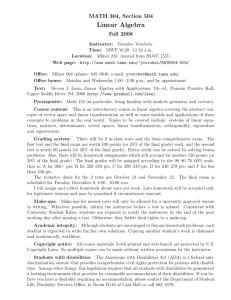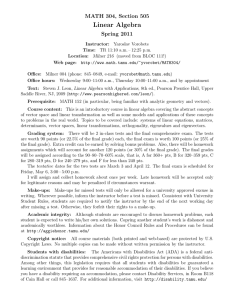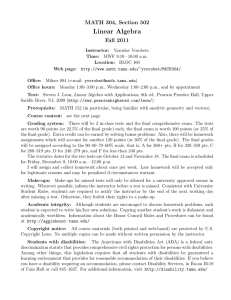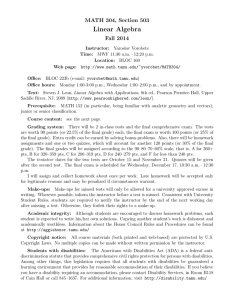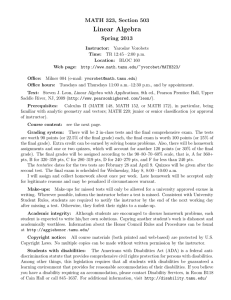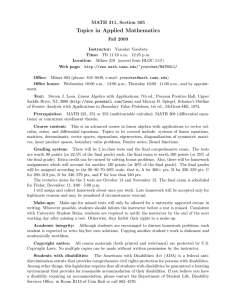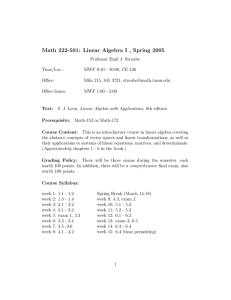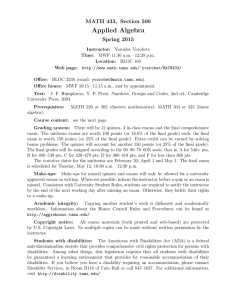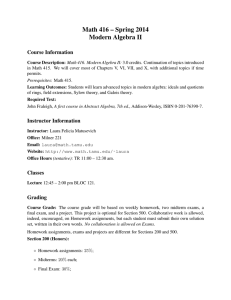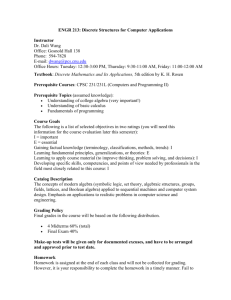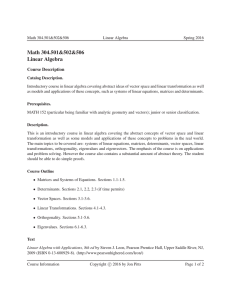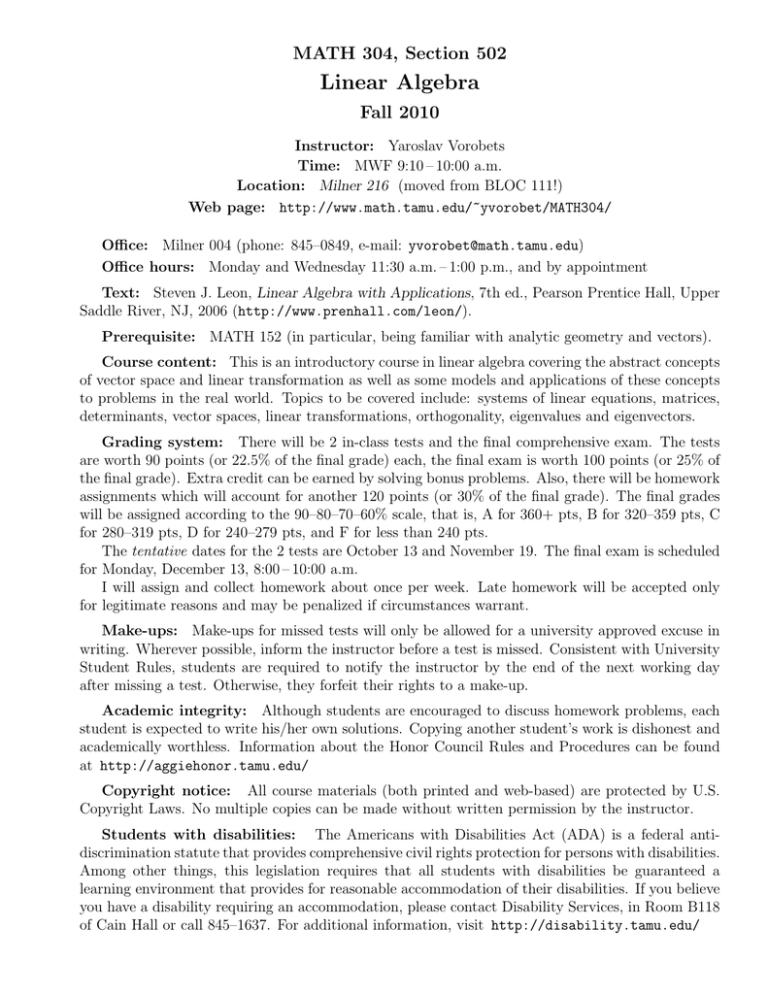
MATH 304, Section 502
Linear Algebra
Fall 2010
Instructor: Yaroslav Vorobets
Time: MWF 9:10 – 10:00 a.m.
Location: Milner 216 (moved from BLOC 111!)
Web page: http://www.math.tamu.edu/~yvorobet/MATH304/
Office: Milner 004 (phone: 845–0849, e-mail: yvorobet@math.tamu.edu)
Office hours: Monday and Wednesday 11:30 a.m. – 1:00 p.m., and by appointment
Text: Steven J. Leon, Linear Algebra with Applications, 7th ed., Pearson Prentice Hall, Upper
Saddle River, NJ, 2006 (http://www.prenhall.com/leon/).
Prerequisite: MATH 152 (in particular, being familiar with analytic geometry and vectors).
Course content: This is an introductory course in linear algebra covering the abstract concepts
of vector space and linear transformation as well as some models and applications of these concepts
to problems in the real world. Topics to be covered include: systems of linear equations, matrices,
determinants, vector spaces, linear transformations, orthogonality, eigenvalues and eigenvectors.
Grading system: There will be 2 in-class tests and the final comprehensive exam. The tests
are worth 90 points (or 22.5% of the final grade) each, the final exam is worth 100 points (or 25% of
the final grade). Extra credit can be earned by solving bonus problems. Also, there will be homework
assignments which will account for another 120 points (or 30% of the final grade). The final grades
will be assigned according to the 90–80–70–60% scale, that is, A for 360+ pts, B for 320–359 pts, C
for 280–319 pts, D for 240–279 pts, and F for less than 240 pts.
The tentative dates for the 2 tests are October 13 and November 19. The final exam is scheduled
for Monday, December 13, 8:00 – 10:00 a.m.
I will assign and collect homework about once per week. Late homework will be accepted only
for legitimate reasons and may be penalized if circumstances warrant.
Make-ups: Make-ups for missed tests will only be allowed for a university approved excuse in
writing. Wherever possible, inform the instructor before a test is missed. Consistent with University
Student Rules, students are required to notify the instructor by the end of the next working day
after missing a test. Otherwise, they forfeit their rights to a make-up.
Academic integrity: Although students are encouraged to discuss homework problems, each
student is expected to write his/her own solutions. Copying another student’s work is dishonest and
academically worthless. Information about the Honor Council Rules and Procedures can be found
at http://aggiehonor.tamu.edu/
Copyright notice: All course materials (both printed and web-based) are protected by U.S.
Copyright Laws. No multiple copies can be made without written permission by the instructor.
Students with disabilities: The Americans with Disabilities Act (ADA) is a federal antidiscrimination statute that provides comprehensive civil rights protection for persons with disabilities.
Among other things, this legislation requires that all students with disabilities be guaranteed a
learning environment that provides for reasonable accommodation of their disabilities. If you believe
you have a disability requiring an accommodation, please contact Disability Services, in Room B118
of Cain Hall or call 845–1637. For additional information, visit http://disability.tamu.edu/
MATH 304, Section 502
Linear Algebra
Fall 2010
Course outline
Part I (≈ 3 weeks): Elementary linear algebra
• Systems of linear equations
• Gaussian elimination, Gauss-Jordan reduction
• Matrices, matrix algebra
• Determinants
Leon’s book: Chapters 1–2
Part II (≈ 4.5 weeks): Abstract linear algebra
• Vector spaces
• Linear independence
• Basis and dimension
• Coordinates, change of basis
• Linear transformations
Leon’s book: Chapters 3–4
Part III (≈ 4 weeks): Advanced linear algebra
• Orthogonality
• Inner products and norms
• The Gram-Schmidt orthogonalization process
• Eigenvalues and eigenvectors
• Diagonalization
Leon’s book: Sections 5.1–5.6, 6.1, 6.3
Part IV (≈ 2 weeks): Topics in applied linear algebra
• Matrix exponentials
• Rotations in space
• Orthogonal polynomials
• Fourier series
• Markov chains
Leon’s book: Chapters 5–6 (selected sections)

